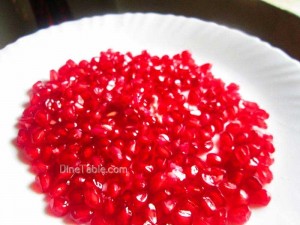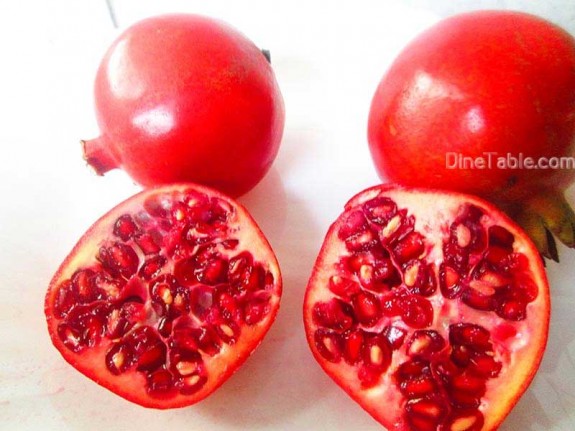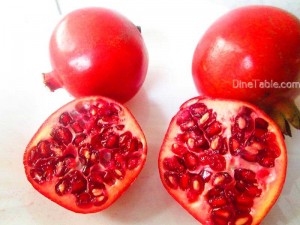Pomegranate an Amazing Fruit – Health Benefits of Pomegranate
Pomegranate an Amazing Fruit – Health Benefits of Pomegranate
Pomegranate nutrition facts and health benefits.
Pomegranate, botanical name Punica granatum, is a fruit-bearing deciduous shrub or small tree growing between 5 and 8 m tall. Pomegranate is a good source of fibre. It also contains vitamins A, C and E, iron and other antioxidants. Compound found only in pomegranates called punicalagin is shown to benefit the heart and blood vessels. It not only lowers cholesterol, but also lowers blood pressure and helps to melt heart blockages.
There are about 13 types of Pomegranate. Pomegranates are very low in Saturated Fat, Cholesterol and Sodium. It is also an excellent source of Dietary Fiber and Folate, and a very good source of Vitamin C and Vitamin K.
One cup of arils (174 grams) contains (2):
Fiber: 7 grams.
Protein: 3 grams.
Vitamin C: 30% of the RDA.
Vitamin K: 36% of the RDA.
Folate: 16% of the RDA.
Potassium: 12% of the RDA.
Pomegranates Contain two unique Plant Compounds With Powerful and effective Medicinal Properties. They are Punicalagins and Punicic Acid.
Punicalagins : Punicalagins are extremely powerful antioxidants found in the juice of pomegranates. They are so powerful that pomegranate juice has been found to have three times the antioxidants of red wine and green tea. Pomegranate has strong anti-inflammatory properties.
Punicic Acid : Punicic acid is the main fatty acid in the arils of Pomegranates which help to protect against several steps in the heart disease process.

Health Benefits of Pomegranate
Health Benefits of Pomegranate
Improves Your Heart Health
Pomegranate juice can have a great impact on health, particularly on the health of the heart, by keeping the arteries flexible and decreasing the inflammation in the lining of the blood vessels. It is known to reduce atherosclerosis, which is one of the leading causes of heart disease.
Reduces Risk Of Cancer
Pomegranate juice eliminates free radicals from the body and inhibits the growth and development of cancer and other diseases. Its high contents of anti- oxidants stimulate the white blood cells to neutralize toxins in the body thereby promoting a strong and healthy immune system.
Prevents Osteoarthritis
Pomegranates help reduce illnesses of many forms, including atherosclerosis and osteoarthritis. The damages that are caused due to the thickening and hardening of the arterial walls and in the cartilage and joints can be cured by eating this fruit.
Good for Diabetes
For diabetic patients, drinking pomegranate juice can reduce the risk of various coronary diseases. Along with this, there is a reduction in the hardening of the arteries, which can inhibit the development of various heart diseases.
Prevents Anemia
Healthy blood flow can be maintained in the body by consuming this fruit in any form. Pomegranate supplies iron to the blood, thus helping to reduce symptoms of anemia, including exhaustion, dizziness, weakness, and hearing loss.

Health Benefits of Pomegranate
Maintains Your Blood Pressure
Pomegranates are also known to reduce high blood pressure. The juice reduces lesions and the inflammation of blood vessels in heart patients. It is a natural aspirin, which keeps the blood from coagulating and forming blood clots. It even acts as a blood thinner allowing for an unrestricted flow of blood through the body.
Dental Care
One of the best benefits of pomegranates is that their juice, along with its antibacterial and antiviral properties, helps to reduce the effects of dental plaque and protects against various oral diseases.
Skin Health
Eating pomegranate can keep your skin youthful, healthy and wrinkle-free. The antioxidants present in pomegranates can help delay the ageing process.
Weight Management
Pomegranate seeds are low in calories and rich in fiber and vitamins. Pomegranate and other fiber-rich foods such as whole grains may help in weight management while reducing your risk of developing chronic diseases.
Plaque Protection
Research published in the Ancient Science of Life found drinking the juice reduces plaque-forming units by 32 percent. The juice’s antioxidants, called polyphenols, are a primary driver behind its believed antibacterial activity.
Reduced Risk of Alzheimer’s Disease
An animal study showed mice fed pomegranate juice experienced lower levels of amyloid plaque, the plaque that accumulates between the brain’s nerve cells, the hallmark sign of Alzheimer’s and improved their performance for certain mental tasks.
Boost Digestive Condition
Pomegranate juice helps to secrete enzymes with anti-bacterial properties that aid digestion and help to fight off hemorrhoids, nausea, dysentery, intestinal parasites, piles and diarrhea. You can also use pomegranate juice as a laxative to treat constipation.
Click here for Healthy & Delicious Pomegranate Recipes















